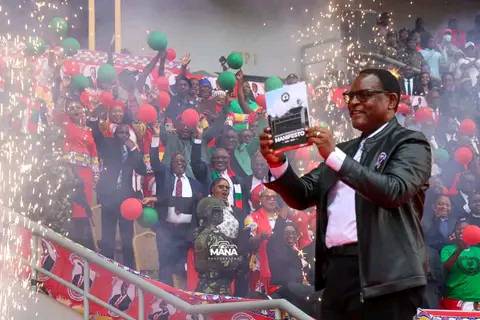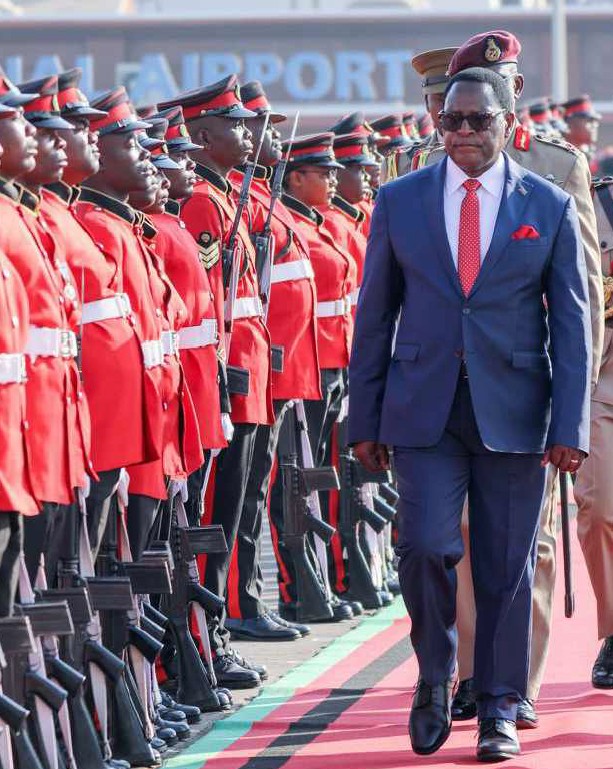Steady in the Storm: A Critical Reflection on President Dr. Chakwera’s First-Term Legacy
As the sun rises on the 2025 electoral season in Malawi, political parties are unveiling their vision for the next five years with manifestos that seek to either reclaim power, retain it, or disrupt the status quo.
But no document has arrived with more weight, both in narrative and content, than the Malawi Congress Party (MCP) 2025–2030 manifesto.
Presented before a packed Bingu National Stadium in Lilongwe by President Dr. Lazarus McCarthy Chakwera, this manifesto is not just an electoral roadmap, it is a bold proclamation of resilience, a meticulous record of delivery, and a philosophical statement about leadership under fire.
In many ways, the MCP manifesto is as much a response to the chaos of the past as it is a blueprint for the future.

It begins with a powerful declaration of vision: a “New Malawi” that is self-reliant, resilient, prosperous, and democratically grounded. Yet this vision is not offered as a dream deferred or as utopian hope, it is rooted in a sobering and honest account of a turbulent first term.
President Dr. Chakwera’s candid recounting of the “painful and joyous” journey since June 2020 is a central narrative device in the manifesto. Rather than masking Malawi’s economic, health, and environmental tribulations, ranging from COVID-19 to cholera, from Cyclone Freddy to widespread droughts, Dr. Chakwera embraces them as context, not excuses.
This is not an insignificant rhetorical move.
It reframes the idea of leadership not as a series of grand gestures, but as a capacity to hold steady, remain accountable, and make progress amid adversity.
The manifesto repeatedly returns to this theme: Malawi’s progress was not inevitable; it was carved out of crisis, through a combination of “grace, resilience, and hard work.”
This framing does not attempt to immunize the MCP from criticisms that the pace of development has been slow or uneven. More importantly, it challenges voters to judge leadership not by perfection, but by steadiness in the storm.
Central to the document is the SUPER Hi-5 philosophy: Servant Leadership, Uniting Malawians, Prospering Together, Ending Corruption, and Rule of Law. The manifesto is structured around these five pillars, offering both retrospective justification and prospective commitment.
But unlike abstract political ideals, these values are grounded in extensive lists of policy achievements that serve to validate the philosophy as operational rather than ornamental.
Servant leadership, the cornerstone of the MCP’s moral architecture, is not merely symbolic.
Chakwera’s frequent appearances in Parliament, his direct engagement with disaster-stricken communities, and his decision to repeal laws that shielded the presidency from public criticism are used to illustrate a humble, accessible presidency.
His decision to transform the State House into a more public space, with town halls, youth forums, and media access, is emblematic of an evolving democratic culture in which leadership is physically and psychologically closer to the people. This contrasts starkly with previous administrations accused of elitism, opacity, and impunity.
The second principle—Uniting Malawians, is particularly potent in a nation long scarred by regionalism, tribalism, and toxic political patronage.
The manifesto celebrates initiatives such as Umodzi Day, the Malawi Peace Commission, and deliberate inclusivity in national mourning and celebration.
Even more politically strategic are Dr. Chakwera’s efforts to rehabilitate relationships with former presidents across the political spectrum, Arthur Peter Mutharika, Bakili Muluzi, and Joyce Banda, portraying himself as a leader above petty vendettas. In a region where political transitions often carry retribution, Dr. Chakwera’s civility is presented as statesmanship.
Equally critical is the third pillar—Prospering Together, which foregrounds social and economic justice.
The manifesto highlights the disbursement of MK250 billion in business loans through the National Economic Empowerment Fund (NEEF), supporting over 275,000 businesses, mostly youth- and women-led.
In a country plagued by unemployment and underemployment, particularly among the youth, such interventions are not just developmental, they are deeply people focused. They are designed to speak to their aspiration and dignity.
In this vein, MCP’s expansion of student loans and construction of educational infrastructure from classrooms to entire innovation hubs like the UniPod (University Innovation Pod), serves to position the government as a promoter of human capital development. It is a deliberate strategy to demonstrate long-term investment in the country’s intellectual future.
What emerges from these statistics is not just a list of accomplishments but a portrait of a government attempting to weave development with inclusion, and growth with equity.
There is a strong emphasis on rural transformation—roads in Blantyre and Mzuzu, stadiums in Zomba, mega farms across the country, water systems in Nsanje and Chikwawa, all designed to decentralize progress.
Even the revival of the country’s rail system, after decades of abandonment, signals a return to basic state functionality, while also symbolizing movement and connection in a broader metaphorical sense.
Perhaps the most politically charged sections of the manifesto deal with corruption and the rule of law.
Here, the contrast with the Democratic Progressive Party (DPP) is starkest. The manifesto spares no punches in its indictment of the previous administration’s “systematized bribery,” “tribalized employment,” and “executive arrogance.” But beyond the finger-pointing, the MCP attempts to substantiate its reformist credentials.
From the appointment and defense of Martha Chizuma as ACB Director to the establishment of the Financial Crimes Court and the amendment of laws to give the ACB prosecutorial independence, Chakwera’s government positions itself as actively confronting corruption, rather than merely lamenting it.
That the president himself offered testimony to the ACB is touted as a historic first, both a political risk and a statement of principle.
However, this self-congratulatory tone is not without vulnerability.
While legislative reforms are cited extensively, over 100 bills signed into law, it is yet to be seen the extent to which these reforms have been internalized by bureaucratic culture or translated into everyday experiences of justice.
Still, the scale of legislative activity, ranging from the Corrupt Practices Amendment Act to the Land Act and Gender Equality Act compliance, suggests a serious attempt to build a rules-based state, even if enforcement remains a long journey.
One of the more impressive achievements is the surge in energy access.
Increasing electricity connectivity from 11% to 25% is no small feat and has profound implications for industrial growth, education, and rural livelihoods.
The completion of 92% of the Mozambique-Malawi Interconnector and financing of the 350MW Mpatamanga Hydropower Project underscore the administration’s commitment to energy transformation, a crucial enabler for all other sectors.

There are other achievements that signal symbolic and functional leadership. Building 100 houses for persons with albinism, for instance, is not just a social intervention but a moral one, given Malawi’s horrific history of albinism-related violence.
Similarly, restoring Malawi’s diplomatic standing, hosting global leaders, attending high-level forums, and chairing international organizations serves not only national prestige but strategic influence.
Yet, perhaps the most profound achievement of Dr. Chakwera’s first term is his success in restoring donor confidence. After nearly a decade in which Malawi struggled to attract direct budget support due to perceived governance failures, Dr. Chakwera’s government managed to bring donors back into the fold.
Hosting the first-ever Malawi-EU Investment Forum, along with World Bank and Global Fund engagements, is more than optics, it signals a rebirth of credibility, which is indispensable for a country whose developmental ambitions still rely heavily on international partnerships.
In summation, the MCP’s 2025–2030 manifesto is not a mere laundry list of promises. It is a comprehensive case for continuity, wrapped in a philosophy of responsive and morally grounded leadership. It seeks to show that Dr. Chakwera’s leadership is not about instant miracles but about laying a resilient foundation under fire. It shows that transformation is not an event, but a disciplined accumulation of reforms, relationships, and resources however incremental or invisible they may appear.
Critics will no doubt find areas where the manifesto overstates its achievements or omits persisting structural challenges, particularly on inflation, forex instability, or persistent rural poverty. But what cannot be denied is the coherence of the MCP’s ideological narrative, the breadth of its delivery amid global turbulence, and the seriousness with which it engages the task of governing.
As Malawians weigh their options ahead of the September 2025 elections, the MCP manifesto does not merely ask for votes, it asks for trust in a tested philosophy and a steady hand.








